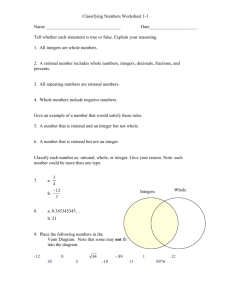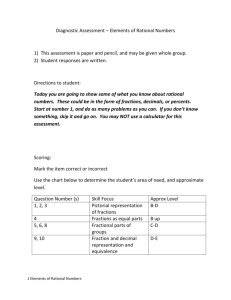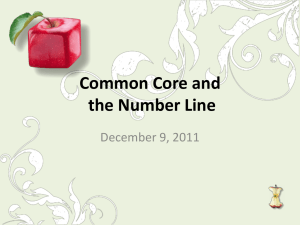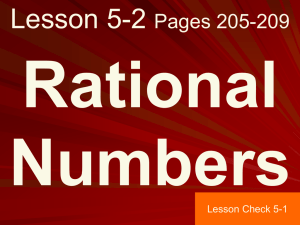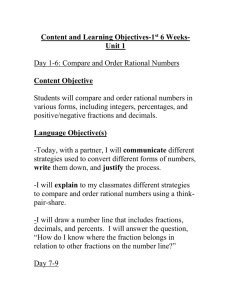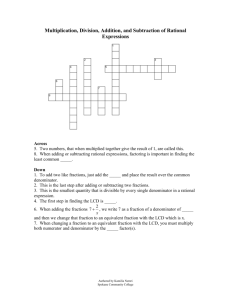Fractions and Rational Numbers
advertisement
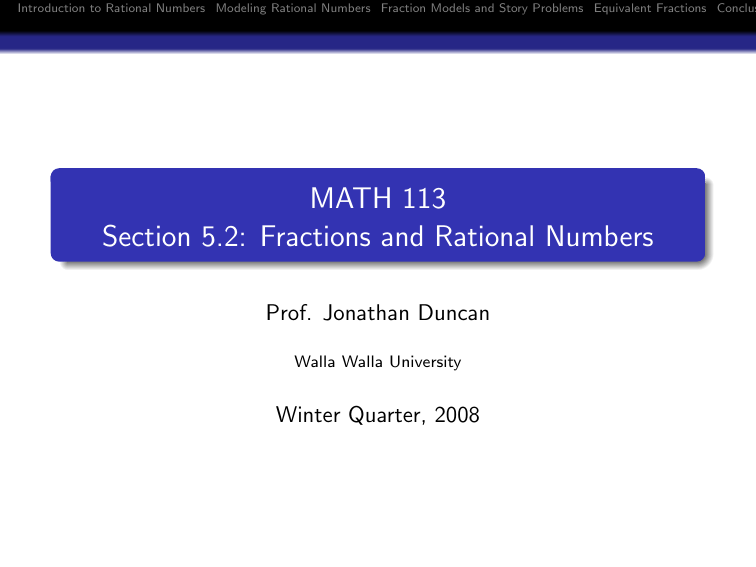
Introduction to Rational Numbers Modeling Rational Numbers Fraction Models and Story Problems Equivalent Fractions Conclus MATH 113 Section 5.2: Fractions and Rational Numbers Prof. Jonathan Duncan Walla Walla University Winter Quarter, 2008 Introduction to Rational Numbers Modeling Rational Numbers Fraction Models and Story Problems Equivalent Fractions Conclus Outline 1 Introduction to Rational Numbers 2 Modeling Rational Numbers 3 Fraction Models and Story Problems 4 Equivalent Fractions 5 Conclusion Introduction to Rational Numbers Modeling Rational Numbers Fraction Models and Story Problems Equivalent Fractions Conclus Adding More Numbers Now that we have discussed the set of integers, it is time to expand our set of numbers yet again with the addition of rational numbers. Rational Numbers The set of rational numbers is the set of all ratios of two integers where the second integer is not zero. That is: na o | a, b ∈ Z and b 6= 0 Q= b Although these are commonly referred to as “fractions” we need to be √ careful. A fraction is a ratio of any two numbers. For example, 2 2 is a fraction but not a rational number. Rational numbers are ratios of integers only. Introduction to Rational Numbers Modeling Rational Numbers Fraction Models and Story Problems Equivalent Fractions Conclus Picturing the Rational Numbers The rational numbers contain the integers (for example, We can represent this using a Venn diagram as follows. 3 1 is 3). Z W N Q Note that in our definition of rational numbers, there are many different ways to represent each number. Find two more ways to represent the integer 3 as a rational number. Rational numbers are the first set of numbers we have seen which are dense. That is, between any two rational numbers, there is another. Introduction to Rational Numbers Modeling Rational Numbers Fraction Models and Story Problems Equivalent Fractions Conclus A Brief History of Rational Numbers Because rational numbers are a more complicated concept that whole numbers, they are a relatively recent innovation. Rational Number Facts Egyptians used fractions, but only “unit fractions” of the form 1 n . These were denoted by placing an oval over the symbolic representation of the denominator. Greeks did not like non-whole numbers so they used ratios instead of fractions. For example, to denote the idea that 2 5 ths of a pie has been eaten, Greeks would say the ratio of the pie that was eaten to the pie that remained is 2 : 3. Introduction to Rational Numbers Modeling Rational Numbers Fraction Models and Story Problems Equivalent Fractions Conclus Three Fraction Models There are many different ways to model fractions. We will focus on three general types of models. Example Draw a picture to model the fraction 45 . In the area model a figure is divided into 5 pieces and 4 of those are shaded. In the linear model a number line is divided into 5 pieces and the first 4 are covered. In the set model 5 objects are drawn and 4 of them are circled. Introduction to Rational Numbers Modeling Rational Numbers Fraction Models and Story Problems Equivalent Fractions Conclus Selecting an Appropriate Model Fractions are used in many different situations and some models are more appropriate than others depending on the situation. Example Determine which model is most useful for each situations. Fractions and Measure I went 45 th of the total distance. Fractions as Quotients I have 4 cookies which I want to split between 5 people. Fractions as an Operation 4 5 ths of your class of 20 people missed Friday’s class. Fractions as Ratios 4 5 ths of your ideas are good ones. What properties or ideas are common to each situation? Introduction to Rational Numbers Modeling Rational Numbers Fraction Models and Story Problems Equivalent Fractions Conclus Fractions and Units In many situations we model fractions by representing the unit (number 1) as a whole object and then dividing it into equal pieces. However, there are situations when it is more convenient to use some other number as the whole and divide it into pieces. Example Use the set model below to represent 23 rd. Justify this in two different ways. =2 Introduction to Rational Numbers Modeling Rational Numbers Fraction Models and Story Problems Equivalent Fractions Conclus Using Fraction Models Fraction models are useful for more than just representing a fraction using pictures. They can also be used to help formulate the solution to a story problem. Example You paid $6 for 1 12 pound of potato salad. What is the cost of one pound of potato salad? While there are several ways to approach this problem, using an area model to represent a whole of 1 21 pounds we can find the solution. If you do not wish to draw a picture, you can solve this problem using ratios. Introduction to Rational Numbers Modeling Rational Numbers Fraction Models and Story Problems Equivalent Fractions Conclus More Story Problems Example Sally has some free time to split between exercising and reading. She spends 16 of her time exercising. If she spends 2 hours more reading than she did exercising, how much free time did she have? Example A thief stole some apples from an orchard. On his way out, he met 3 watchmen, one after the other. He gave each watchman 12 of the apples that he had at the time and two more besides. He escaped with one apple. How many apples did he originally steal? Example A business man spends 31 of his travel budget on food. He splits this evenly between groceries and dining out. If he spends $20 on each of the 6 meals he eats out, what is his travel budget. Introduction to Rational Numbers Modeling Rational Numbers Fraction Models and Story Problems Equivalent Fractions Conclus Defining Equivalence At the beginning of the class, we commented that there are many different ways to represent a single number using fractions. Equivalent Fractions Fractions are called equivalent if they represent the same value. Example In each example, use two different models to show that the fractions are equivalent. 1 2 3 4 3 2 = = 9 12 15 10 Procedure What is the procedure which we follow to determine if are equivalent? 3 4 and 9 12 Introduction to Rational Numbers Modeling Rational Numbers Fraction Models and Story Problems Equivalent Fractions Conclus Simplest Form Since there are so many different ways to write a single rational number, it is convenient to have a single preferred form. Simplest Form A fraction is in simplest form (also called reduced) if the numerator and denominator are relatively prime. Reducing to Simplest Form There are several methods to reduce fractions to simplest form. Guess and Check Recognizing Factors Prime Factorization Example Reduce 56 32 to simplest form. Introduction to Rational Numbers Modeling Rational Numbers Fraction Models and Story Problems Equivalent Fractions Conclus Important Concepts Things to Remember from Section 5.2 1 The definition of rational numbers and how they relate to other number sets 2 Three models for fractions: Area model Linear model Set model 3 Using fraction models to solve story problems 4 Identifying equivalent fractions
